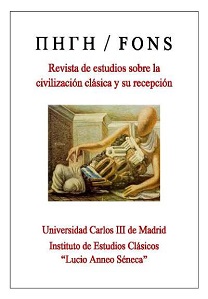The Guilty Belly
Economies of Gluttony in Plato’s Republic
Abstract
This article aims to show the close relationship between the economic phenomena described and analysed by Plato in the Republic and certain practices related to food. By relying on the Timaeus’ statements on the physiological processes related to food processing and on the considerations present in Letter VII on eating habits, we will show that, in addition to his awareness of the ethical and social role of food, the philosopher recognises in the diaita an economic and political operation in itself. In this sense, in addition to contributing new elements to the reflection of his contemporaries on food ethics, Plato is the first to develop a theory according to which the way in which man feeds himself defines to a large extent the economic behaviour of cities and, therefore, shapes their politics.
Downloads
References
Bibliografía
- Ediciones de la República, el Timeo y la Carta VII
Eggers Lan, C. (2008), Platón, República, introducción, traducción y notas, Madrid.
Leroux, G. (2004), Platon, La Repúblique, introduction, traduction et notes, Paris. Durán, M.A.-Lisi, F. (1992), Platón, Filebo, Timeo, Critias, traducciones, introducciones y notas, Madrid.
Brisson, L. (1987), Platon, Lettres, traduction, introducton et notes, Paris.
Cano Cuenca, J. (2014), Platón, Carta VII, Traducción, introducción, notas y comentario, Madrid.
Estudios
Abis, S. (2015), «Le blé: géohistoire d’un grain au cœur du pouvoir», Géoéconomie 77, 195- 215.
Amigues, S. (2007), «L’exploitation du monde végétal en Grèce classique et Hellénistique», Topoi, 15, 1, 75-125.
Amouretti, M.C. (1986), Le pain et l’huile dans la Grèce Antique. De l’araire au moulin, Besançon.
Arruza, C. (2016), «Philosophical Dogs and Tyrannical Wolves in Plato’s Republic», in S. Arruza, D. Niculin (eds.), Philosophy and Political Power in Antiquity, Leiden, 41-66.
Auberger, J. (1995), «Dis-moi ce que tu manges, je te dirai qui tu es», Revue des Études Anciennes 97, 461-471.
Bouyssou, G.S. (2013), «Le tyran ou le banquet impossible», in B. Lion, C. Grandjean y Ch. Hugoniot (eds.), Le banquet du monarque: dans le monde antique, Tours, 71-86.
Campese, S, Canino, L.L. (1998), «La genesi della polis», in M. Vegetti (ed.), Platone. La Repubblica. 285-332.
Cano Cuenca, J. (2014), «Política, dieta y salud: el analogon médico en la Carta VII», Areté 26, 2, 187-205.
Chandezon, Ch. (2003), L’élevage en Grèce (fin Ve -fin Ie S.A.C.), Bordeaux.
Damet, A. (2010), «Le tyran oedipisé. La projection fantasmatique des désirs dans le rêve platonicien», Hypothèses 13, 285-294.
Darmezin, L. (1991), «L’approvisionnement en blé des cités grecques à l’époque héllénistique», in M.C. Cauvin (ed.), Rites et rythmes agraires. Séminaire de recherche, Lyon, 113-118.
Helmer, E. (2021), La Parte de Bronce. Platón y la economía, Santiago.
Hitz, Z. (2010), «Degenerate regimes in Plato’s Republic», in M. Mcpherran (ed.), Plato’s Republic. A Critical Guide, Cambridge, 103-146.
Johnstone, M.A. (2015), «Tyrannized Souls: Plato’s Depiction of the Tyrannical Man», British Journal for the History of Philosophy 23, 3, 423-437.
Ménissier, T. (2003), «Philosophie politique et anthropologie de la férocité», Raisons politiques 9, 1, 19-31.
Meulder, M. (2013), «L’exclusion au livre VIII de la République de Platon», Revue belge de philologie et d’histoire 91, 89-112.
Montoya, M.D.P. (2013), «Platón frente al comercio marítimo. Elementos para una interpretación del Antropoceno», Revista de Filosofía de la Universidad de Costa Rica LXII 164, 93-103.
Montoya, M.D.P. (2023), «Mélange et Sexualité dans les Cités Platoniciennes. La dimension politique de la sexualité dans les cités platoniciennes», Ordia Prima 1, 1-15.
Notario, F.-P. (2016), «Les empires dévoreurs: l’empire perse, l’Athènes du Ve siècle avant J.- C. et la métaphore alimentaire du pouvoir», Gaia 19, 247-258.
Notario, F.-P. (2015), «Plato’s political cuisine: commensality, food, and politics in the platonic thought», Ágora. Estudos Clássicos em debate, 17, 123-158.
Romeri, L. (2005), «L’akolasia est en nous (Platon, Tim. 72e). Deux solutions à l’intempérance humaine: Platon et Plutatque», Kentron 21, 225-240.
Romeri, L. (2015), «Régimes alimentaires et régimes politiques chez Platon», Food and History 13, 1-3, 165-180.
Roubineau, J.M. (2015), Les Cités Grecques (VI-II siècle av. J.-C.), Paris.
Roubineau, J.-M. (2017), Les Cités Grecques (VIe -IIe av.J.-C.). Essai d’Histoire Sociale, Paris.
Ruzene, F.D. (2022), À mesa de Platão: Filosofia e Alimentação nos diálogos socrático-platônicos, Curitiba.
Schöpsdau, K. (2002), «Des repas en commun pour les femmes. Une utopie platonicienne », Revue Française d’Histoire des Idées Politiques 16, 331-340.
Schmitt Pantel, P. (1992), La cité au banquet. Histoire des repas publics dans les cités Grecques, Roma.
Silvermintz, D. (2014), «Plato and Food», in D.M. Kaplan, P.B. Thompson (eds.), Encyclopedia of Food and Agricultural Ethics, London, 2001-2007.
Sissa G. (1997), Le Plaisir et le Mal. Philosophie de la drogue, Paris.
Soares, C. (2016), «Cozinha simples, mesa farta: os requintes da gastronomia mediterrânea grega antiga (Arquéstrato, sec. IV a.C.)», in J. Pinheiro, C. Soares (eds.), Patrimónios Alimentares de Aquém e Além-Mar, Coimbra, 479-498.
Zoller, C. (2015), «Plato on Food and Necessary and Unnecessary Appetites in the Republic», in C. Gallin, S.S. Magibleras (eds.), Odysseys of Plates and Palates: Food, Society and Sociality, Leiden-New York, 23-30.
Se permite que los autores de los artículos y de las discusiones publicados en la revista los reproduzcan en otros sitios siempre y cuando se haga mención de que han sido previamente publicados en ΠΗΓΗ/FONS.




